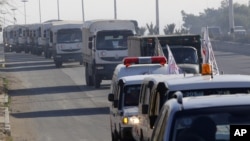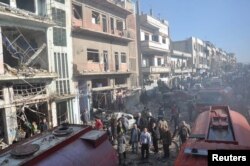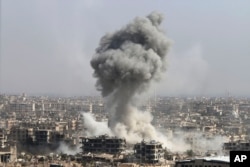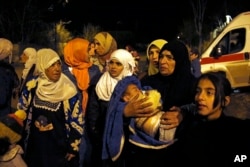The U.S. and Russia will launch an effort Friday that could bring long-term stability to efforts to get humanitarian aid to besieged areas of Syria.
The two countries, under the auspices of the United Nations, will co-chair an initial meeting of a cease-fire task force in Geneva.
The task force will explore prospects for a long-range cessation in Syria, where a five-year civil war has resulted in the deaths of more than 400,000 people and the displacement of millions more.
The 17-nation International Syria Support Group devised the plan for the task force during its meeting last week in Munich. The cease-fire would not include terrorist groups, such as the Islamic State and al-Nusra Front.
"This group [task force] will work to develop the modalities for a long-term, comprehensive and durable cessation of violence, of hostilities," said U.S. Secretary of State John Kerry.
He commented in a news conference Feb. 12 with Russian Foreign Minister Sergey Lavrov and U.N. Special Envoy Staffan de Mistura, following the support group's meeting.
Lavrov said the task force would include diplomats and the military. Later, at a Wednesday briefing in Moscow, he said, "Everything depends on the Americans, on their willingness to honestly cooperate at the military level."
The Syria support group had hoped to implement an initial cessation in Syria about a week after its Munich meeting, with a goal of having the task force work on a longer-term cease-fire. It is unclear if the U.S. and Russia will make enough progress in Friday's talks to announce a cease-fire.
"We are pushing as fast as possible on this," said State Department spokesman Mark Toner.
Uncertainty reigns
With Russia backing Syrian President Bashar al-Assad's regime and the U.S. backing the country's moderate opposition, there are mixed views on whether the two sides can bridge gaps to achieve a lasting cessation of hostilities.
"I wish I could share the views of some of my friends who see this agreement as a potential breakthrough, but unfortunately I do not," said Senate Armed Services Committee Chairman John McCain, shortly after the plan was announced.
"If Russia or the Assad regime violates this agreement, what are the consequences? I don't see any," said McCain in a speech at a security conference in Munich.
Other analysts expressed concern that the Russian-backed Assad regime would be reluctant to give up momentum gained during its aerial bombardment on rebel targets in the northern city of Aleppo.
"The U.S. needs to obtain more bargaining chips," said Itamar Rabinovich, an analyst at the Brookings Institution's Center for Middle East Policy.
If the U.S and Russia jointly used their leverage, however, they could change the situation on the ground in Syria, said Daniel Serwer, a conflict management professor at the Johns Hopkins School of Advanced International Studies.
"In theory, at least, if the United States and Russia were to truly agree to a cessation of hostilities, they could bring a lot of pressure to bear on the warring parties to stop the hostile activities," he said.
Serwer said both countries might be motivated to pursue a long-term cease-fire plan, because neither would want to be "blamed" for continuing the war.
"For both Moscow and the United States, I think there is some benefit for being seen as supporting the delivery of humanitarian assistance," Serwer said.
Increased efforts, uneven results
In Munich, the International Syria Support Group also agreed on a plan to expand humanitarian assistance in Syria.
The move could help lead to the resumption of U.N.-mediated talks later this month between the Syrian government and the moderate opposition.
The first round of proximity talks bogged down earlier this month, partly due to opposition complaints about the worsening humanitarian crisis that had resulted from the Russian-backed Syrian government's bombing campaign in Aleppo.
On Thursday, a U.N. spokesman said Syria envoy de Mistura updated the International Syria Support Group on progress in getting aid to Syria.
He said 114 trucks had reached 82,000 people in besieged parts of the country Wednesday. The spokesman said de Mistura added that the effort needed to be expanded in order to assist all Syrians in need.
In spite of progress in humanitarian efforts, Rabinovich said the support group's long-term goal of a political transition in Syria could be in jeopardy.
"President Assad is determined to stay," Rabinovich said. "He will try to manipulate any negotiation and any diplomatic process in order to perpetuate himself in power."







